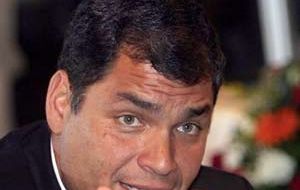MercoPress. South Atlantic News Agency
China loans and oil prices boost Ecuador economy two years after default
 President Rafael Correa defaulted on 3.2 billion US dollars in sovereign bonds
President Rafael Correa defaulted on 3.2 billion US dollars in sovereign bonds Ecuador’s bonds are rewarding investors with the best performance in Latin America as Chinese loans and higher oil prices boost confidence in the economy two years after the country defaulted on 3.2 billion US dollars in debt.
Ecuadorean dollar debt has returned 13% this year, compared with 5.2% for Latin American sovereigns on average, according to JPMorgan Chase & Co. Yields on bonds due 2015 fell 238 basis points, or 2.38 percentage points, this year to 9.59%. Similar maturity Brazilian bonds yield 1.9%, down 97 basis points from the end of December.
Loans from China that Ecuador says will reach at least 3bn in 2011 and the government’s forecast for oil revenue to exceed the budgeted amount by 601 million USD are reassuring investors that South America’s seventh-biggest economy will keep servicing its debt, said Richard Francis, an analyst at Standard & Poor’s in New York. Government investment and consumption are driving the economy’s 12th straight year of expansion, he said.
“China is providing substantial financing that’s letting the government invest a lot more,” Francis said in a telephone interview. “This year and next year there’s no problem.”
Ecuador is expected to grow faster this year than the 5.06% forecast in the 2011 budget in part because of higher oil prices due to conflict in the Middle East and energy shortages in Japan following the March earthquake, Economic Policy Minister Katiuska King said in a speech in Quito.
Government spending on projects from roads to hydroelectric dams is creating jobs and pushing local companies to increase output to meet growing demand, former Finance Minister Alfredo Arizaga said.
“The country will maintain its high GDP growth that’s being fed by substantial fiscal spending,” said Arizaga, an economist at Quito-based think tank Quantum Informe. “We’re also seeing a significant increase in private investment which offers an outlook of greater stability in economic growth.”
Ecuador’s economy expanded 6.98% in the fourth quarter from a year earlier, the fastest pace in more than two years.
Finance Minister Patricio Rivera said last week that Ecuador is seeking a 2 billion loan from China, on top of the 1 billion that PetroChina Co., the Asian nation’s largest oil producer, released in February in exchange for future oil sales. Ecuador negotiated a similar deal with China for $1 billion in 2009.
Ecuador got a separate $1 billion, four-year loan from China Development Bank Corp. last year for infrastructure projects at an interest rate of 6%. The Export-Import Bank of China in June 2010 agreed to finance a 1.68 billion, 1,500-megawatt hydropower plant in the Amazon region, known as Coca-Codo Sinclair. China’s Sinohydro Corp. will build it.
The Chinese loans are damping concern that Ecuador will struggle to come up with financing after the default shut the country out of international credit markets. President Rafael Correa stopped payments on 3.2 billion in bonds due 2012 and 2030 in December 2008 and March 2009 saying the securities were “illegitimate” and “illegal.” The government’s bonds due in 2015 were the only global notes Correa kept servicing.
Ecuador’s default reduced the nation’s net debt burden to 26 percent of gross domestic product in 2009 from 31 percent a year earlier, according to central bank data. The debt-to-GDP ratio, while “pretty low” will reach the “high 20s” this year and increase to about 34 percent of the nation’s GDP by 2012, S&P’s Francis said.




Top Comments
Disclaimer & comment rules-

Read all commentsEcuador’s Finance Ministry, which forecast a $3.73 billion budget deficit in its 2011 spending plan, said in October that outlays this year were “covered.” Ecuador, the smallest member of the Organization of Petroleum Exporting Countries, this week raised its Oriente oil price forecast by 25 percent to $91.30 per barrel from the $73.30 estimated in the 2011 budget presented to Congress in October. Oil provides the government with 24 percent of revenue, according to the Finance Ministry.
Jul 01st, 2011 - 08:10 am 0http://cashadvancesus.com/fed-releases-loan-data/
Commenting for this story is now closed.
If you have a Facebook account, become a fan and comment on our Facebook Page!